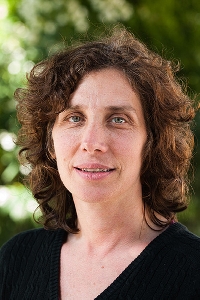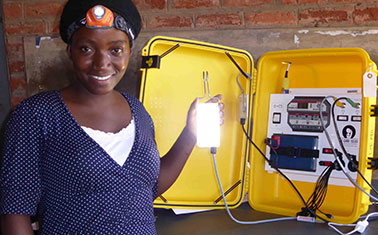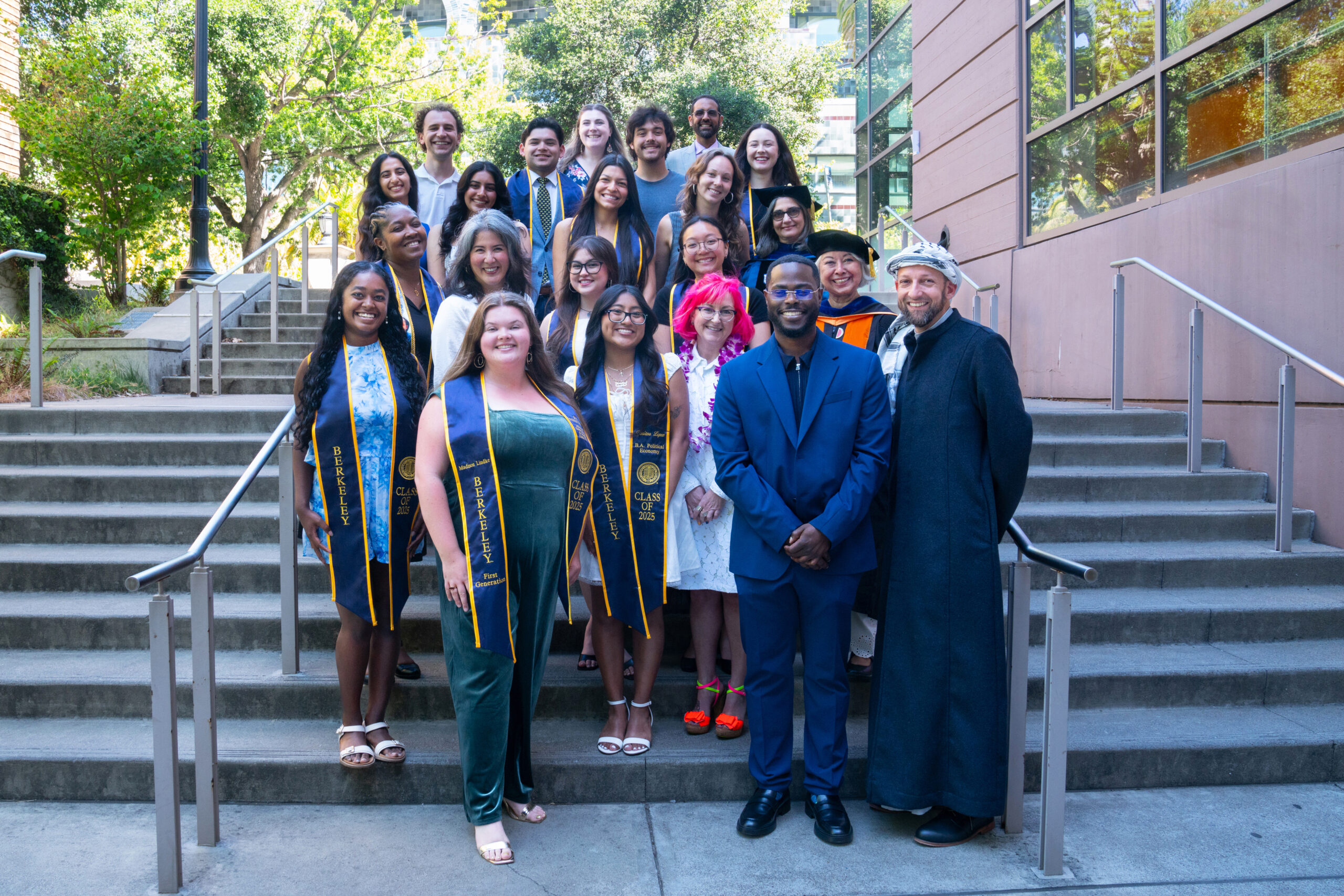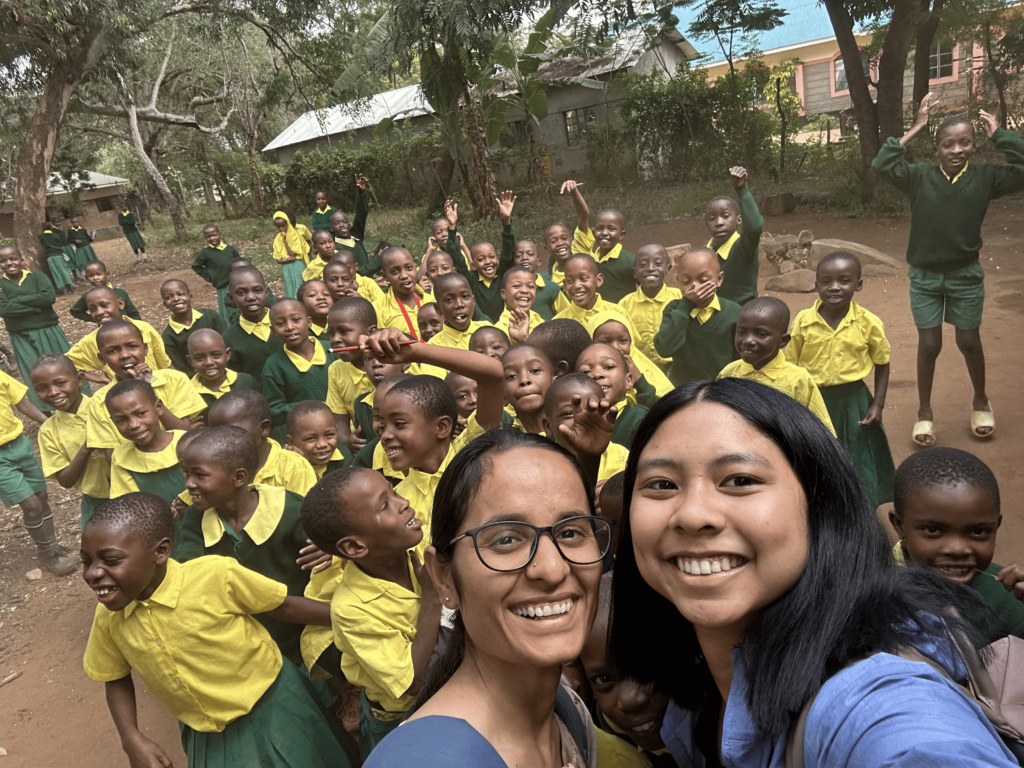By Tamara Straus

Laura Stachel never meant to be a social innovator. She never imagined working in developing countries. And if you told her 10 years ago, that she and her husband, Hal Aronson, would come to focus on energy poverty in healthcare—and that they would deliver their 1000th “Solar Suitcase” to provide electricity to health clinics trying to recover from the Ebola outbreak in Sierra Leone, she would have looked at you with undisguised amusement.
But this, in an overly simplified way, is what has happened to Stachel over the last five years. In 2008, after a back injury ended her career as an obstetrician, she enrolled at University of California, Berkeley, to earn a master’s degree in public health. An invitation to observe the maternity ward at a state hospital in northern Nigeria came from Daniel Perlman, a medical anthropologist at the university’s Bixby Center for Population, Health & Sustainability. Stachel leapt at the chance to connect her expertise in maternal health to her current studies, and headed to Abuja.
At the Nigerian hospital, as she writes in an essay in the 2013 book The Rise of the Reluctant Innovator, “I was immediately struck by the grim conditions. The labor room had four bare metal delivery tables, a limited collection of obstetric instruments, a newborn incubator that hadn’t worked in years, a broken lamp, two newborn scales in poor condition, and little else. There were no mattresses, sheets, bright lights or monitors characteristic of an American hospital. Most striking were the frequent power outages that left the hospital in darkness, creating an immense barrier to care.”
Stachel was deeply disturbed that the hospital’s frequent power outages meant emergency patient care was delayed, disrupted, or just impossible. And suddenly a statistic—that half a million women die each year in childbirth, 99 percent of them in developing countries—was understandable. She described the desperate hospital conditions in an email to her husband. Aronson, who taught solar energy technology in California, decided the sun could provide electricity to the hospital during outages. And when Stachel returned, they embarked on what could become a lifelong journey to provide portable solar energy solutions to places like the state hospital in Zaria, Nigeria.
Stachel credits UC Berkeley and the Blum Center for Developing Economies as among the main forces that enabled her and Aronson to pursue their ideas and then implement them. “This project has always been part of the university,” she said on a typically busy morning of staff, student interns, and masses of email in her Blum Center office. “We’ve been able to tap into the university’s amazing human resources—faculty advisers in the School of Public Health, the School of Engineering, Lawrence Berkeley National Laboratory, Haas School of Business, and students from across campus. I would never even have been put into a position to see the problems I saw without having the university context of people doing research in Nigeria and exploring maternal mortality through hospital ethnography.”
The Blum Center has provided crucial support from the beginning. When Stachel returned home from Nigeria in April 2008, Aronson worked with her to sketch a design for a stand-alone solar electric system for the Nigerian hospital’s maternity ward, labor and operating rooms, and lab. The problem was how to pay for it. Stachel noticed that the campus-wide innovation contest Big Ideas @ Berkeley, now run by the Blum Center, was advertising a $12,500 prize for a social good technology. But the deadline was less than two weeks away.
Stachel, Aronson, and two students from the School of Information and the Energy & Resources Group, Melissa Ho and Christain Casillas, applied anyway and won a $1,000 honorable mention, not enough to fund the project. Then, a few hours after the winners were announced, Thomas Kalil, a university technology policy advisor who had created Big Ideas, called. “You should have won,” he said. “How much do you need?” Three weeks later, Kalil secured more funding through the Blum Center, whose mission is to alleviate global poverty through education and innovation.
 The first year of We Care Solar, as Stachel dubbed the nonprofit, was devoted to developing the solar electric system for the state hospital in Zaria. To prepare for a trip in which hospital workers would give feedback, Aronson placed demonstration solar equipment in a large suitcase for his wife to carry. After she unpacked the suitcase and got the components to work, not only did the head of hospital give approval for the full installation six months hence—an operating room technician by the name of Aminu Abdullahi, said: “You must leave your suitcase here. This will help us save lives now.” The idea for a portable solar system in a suitcase was born.
The first year of We Care Solar, as Stachel dubbed the nonprofit, was devoted to developing the solar electric system for the state hospital in Zaria. To prepare for a trip in which hospital workers would give feedback, Aronson placed demonstration solar equipment in a large suitcase for his wife to carry. After she unpacked the suitcase and got the components to work, not only did the head of hospital give approval for the full installation six months hence—an operating room technician by the name of Aminu Abdullahi, said: “You must leave your suitcase here. This will help us save lives now.” The idea for a portable solar system in a suitcase was born.
When Stachel returned to Nigeria in April 2009 to oversee the larger hospital installation, she saw the fruits of her husband’s work: midwives could perform obstetric procedures throughout the night, doctors and nurses could be summoned quickly through solar-powered walkie-talkies, and patients were no longer turned away for lack of power.
Word spread quickly of We Care Solar’s innovation. After a chance meeting in April 2009 with Nicholas Kristof, the New York Times columnist wrote about Stachel’s successful solar power installation, and the former obstetrician was inundated with requests for similar systems in maternity wards throughout Africa and Asia. “That’s when I realized the need extended far beyond Nigeria,” she said, “and that we needed an intervention that could scale.” Stachel, Aronson, and their small team of volunteers began making portable systems from their Berkeley home, while applying for all manner of fellowships and social innovator contests to make ends meet.
We Care Solar has since won multiple awards from UC Berkeley, including CITRIS’ Big Ideas Award, a Global Social Venture Competition Award, and the Chancellor’s Award for Civic Engagement—as well off-campus recognition from the United Nations Global Citizen Award, the Department of Energy and MIT C3E Award for Advancements in the Developing World, the CBS Jefferson Award for Public Service, and the 2013 CNN Top Ten Heroes Award, among others. Additional support has come from UC Berkeley’s Development Impact Lab, which is funded by the United States Agency for International Development. USAID’s Administrator Raj Shah has cited Solar Suitcases as a lead example of high-impact university innovation.
“We Care Solar is one of UC Berkeley’s social innovation jewels,” said Maryanne McCormick, executive director of the Blum Center. “It rose out of a student innovation contest at Cal and has been nurtured by a constellation of faculty, staff, students, and programs. It’s been an education to see it grow.”
To date, We Care Solar’s staff of six has equipped off-grid medical clinics with power in 17 African countries, 10 Asian countries, and in Mexico, Nicaragua, and Haiti. Solar Suitcases are being used not just to provide medical and surgical lighting in blackouts, but to power cell phones and essential medical devices. In addition to installations in clinics and hospitals, Solar Suitcases also have been used for emergency and humanitarian relief. When the 8.0 magnitude earthquake struck Haiti in 2010, emergency medical providers contacted We Care Solar and Aronson managed to retrofit the suitcase design for the country’s energy needs. After Typhoon Haiyan struck the Philippines in 2013, We Care Solar received funding from the MacArthur Foundation to bring in 100 Suitcases for emergency workers and maternal health centers. In 2014, as Ebola swept through Sierra Leone and Liberia, World Health Organization and ministry of health officials reached out to Stachel for additional Solar Suitcases to power Ebola checkpoint centers and health clinics. Eventually, though a partnership with Direct Relief and three in-country NGOs, We Care Solar sent 15 Solar Suitcases to Liberia and 70 Solar Suitcases to Sierra Leone. Among them, was the 1,000th that We Care Solar manufactured and distributed.
Of course, 1,000 portable solar energy systems is a far cry from the estimated 300,000 that are needed in low-resource clinics and hospitals. On this point, Stachel is not exactly sanguine. “Our goal is to try to get to 5,000 in a few years,” she said, “but I have to say that we had that goal a few years ago. It’s been really humbling to work in foreign countries and to see what’s involved in logistics.”
Stachel continues: “There are people who say, ‘Why aren’t you making 10,000 of these and just sending them out?’ My answer is: We are really sensitive to the fact that the developing world is replete with broken technologies. Training is really important—and training takes time and cultural awareness.”
Stachel used to hand deliver every Solar Suitcase, but that was not scalable. So the nonprofit has been training solar technicians, called “Solar Ambassadors,” to train hospital workers and ministry of health technicians in Eritrea, Ethiopia, Malawi, Sierra Leone, Tanzania, Uganda, and the Philippines. “The most challenging thing is not the training,” said Stachel, “but sustaining the technology. How do you make sure it will work five years from now? By definition, these government health clinics are terribly under-resourced.” Stachel recounts a recent trip to Malawi, where one clinic lacked paper on which nurses could write patient notes. “How is that clinic going to have batteries, when a replacement is needed in two years or five years?”
Like many nonprofits working in poor countries, We Care Solar is obsessed with identifying best practices. Stachel and her team are using their Blum Center funding—and Stachel’s position there as a staff researcher—to explore models for how to get more Solar Suitcases sustainably into the field. The answer, so far, seems to be partnerships. Over the years, graduate students from the Haas School’s International Business Development Program have helped We Care Solar identify international and nation-based healthcare organizations who can share costs and logistics and whose staff can serve as Solar Ambassadors. Current partners include UNICEF, Save the Children, Pathfinder International, World Health Organization, Stiftung Solarenergie Foundation, and many ministries of health—and, due to these associations, the number of installations has been expanding dramatically.
“Right now, we are trying to show a model of what is possible,” said Stachel. “On the one hand, there is no reason that every health center shouldn’t be electrified. We have the technology. On the other hand, priming the ecosystems to accept, install, and be educated on how to use the technology and have a system of maintenance for it, is crucial. If we get enough funding to scale to 300,000 suitcases, we want an ecosystem in place and we want that ecosystem to work.”




